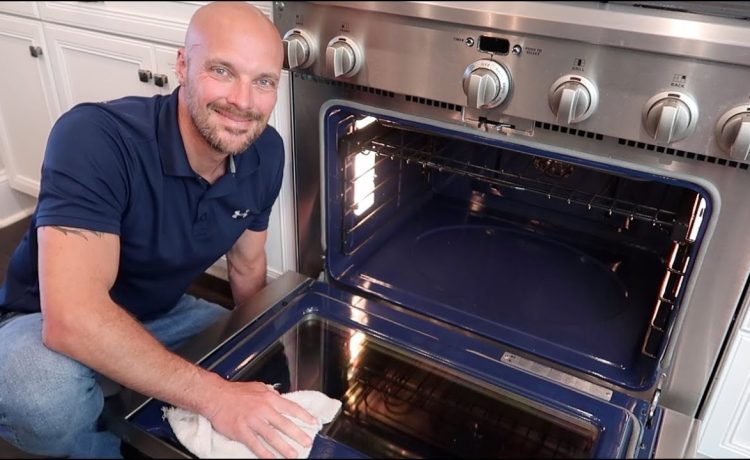Most of us put off cleaning the oven, particularly if we are worried about the strong smells from those heavy-duty cleaning products.
Indeed, we have all been there. The filth accumulates, and soon, your once-clean oven becomes almost unrecognisable. Still, the thought of using compounds that call for a ventilated room and a gas mask is not quite tempting.
Luckily, there’s a milder approach to handling that tough grease without endangering your family or yourself. Let’s discuss various natural substitutes and investigate how experts can help if needed.
Why Should You Avoid Harsh Chemicals?
Many store-bought oven cleaners include strong chemicals meant to cut through the toughest layers of food residue and oil. Although they work well, many of these products include corrosive chemicals like sodium hydroxide.
This ingredient can aggravate respiratory problems and burn skin. Those with sensitive skin, asthma, or small children should steer clear of such products.
Furthermore, these strong compounds do not just linger in the oven. If the area isn’t well-ventilated, the odour will stay in the air and adhere to your kitchen surfaces or even your food.
Not only that, but these products can also damage your appliance, leading to faulty ignition and other costly issues.
The answer to this dilemma lies in employing gentler methods. Other natural cleaning techniques are equally successful, but considerably safer for you and your family.
The Magic of Baking Soda and Vinegar
At this point, it’s almost a cliche, but this combo brilliantly cleans most surfaces. When it comes to handling oven problems without resorting to harmful chemicals, this classic baking soda and vinegar mix is your friend.
You can accomplish this as follows:
Create a Paste
To make a thick mixture, add baking soda to a small amount of water. Concentrating on regions with tough filth, spread this over the oily surfaces of your oven.
Let the Baking Soda Do Its Job
The more time you wait, the better the outcome will be. For optimal results, aim for a minimum of 12 hours or leave the paste to do its magic overnight. The mildly abrasive baking soda helps dislodge grease without damaging the oven surface.
Add Vinegar
After your baking soda has worked its wonders, mist white vinegar over the paste. The vinegar’s reaction with the baking soda will produce a fizzing activity that aids in peeling off the grease and dirt.
Wipe Those Stains Away
After the fizzing stops, use a moist cloth to clean the oven. For especially tough stains, you will probably have to go through the process again. However, after only one treatment, you will clearly see progress.
Citrus
Lemons are another naturally occurring cleaner with great power and a pleasant scent. They are a wonderful option for cleaning your oven since they include citrous acid, a strong degreaser.
Squeeze two or three lemons into a baking dish half filled with water. Set the dish in the oven and heat it to about 120°C (250°F). Allow the concoction to simmer for roughly thirty minutes. Any grease or filth on the oven’s inside will soften thanks to the steam from the lemon water.
After turning off the oven, let it cool somewhat before gently cleaning it with a moist towel. Your oven will smell quite fresh, and the grease should now be easily removed.
This approach not only eliminates chemicals, but also leaves your oven smelling great, resulting in a natural, citrusy kitchen aroma.
The Power of Salt for Stubborn Stains
Particularly greasy spills can bake onto surfaces and become a nightmare to clean later on. When this is the case, salt can come in handy, since it breaks down and absorbs grease.
If you find some drips in your oven, liberally sprinkle salt over the mess. This keeps the liquid from hardening into an uncompromising stain.
Once the oven has cooled, wipe away the salt and the grease it absorbed with a moist sponge or cloth. Though this method is still useful even if you’ve let the stain sit for some time, it works best if you act fast.
DIY Steam Cleaning
You most certainly know about the in-built vapour cleaning feature of your self-cleaning oven. However, you can produce a similar result without depending on that mode, which can sometimes overheat or harm delicate parts.
Pour water into a baking dish and crank up the heat to high (200°C or 400°F). Carefully slide the dish inside the hot oven, keeping the door closed.
Leave it for roughly half an hour to let the steam release any food bits or filth. Turn off the oven, let it cool somewhat, and then gently wipe the inside with a cloth.
Steam makes cleaning baked-on filth considerably easier since it naturally lifts it. This hack is another excellent chemical-free solution that depends on just water and heat.
Professional Help: Local Oven Cleaners to the Rescue
Even with natural treatments, not everyone has the time or patience to clean their oven. Local oven cleaners then become useful. It could be time to call in an expert if your appliance hasn’t seen a decent cleaning in years or if you have tried the natural path to no avail.
These specialists recommend environmentally friendly, tough-on-grime cleaning products that are safe for your house and surroundings.
Contacting a licensed oven cleaner is fantastic because they have the gear and knowledge to deep clean even the most neglected appliances. Furthermore, several local businesses now provide non-toxic cleaning solutions that fit your goal of staying away from strong compounds.
Without thinking about residual fumes or dangerous chemicals, you can unwind while they guarantee that your oven will stay shining clean.
Maintaining a Clean Oven: Prevention Is Key
Adopting some minor measures will help you avoid wasting hours scouring your cooking appliances. Just try the following:
Line the Floor
To catch any drips or spills at the bottom of your oven, lay an oven liner or a sheet of aluminium foil there. They can be easily cleaned or disposed of. Later on, this basic trick will save you hours of scrubbing.
Wipe Your Oven Frequently
While this tip can sound time-consuming, it will actually cost you just five minutes of your time. Use a moist cloth to clean your oven quickly after you’re done cooking. This keeps dirt from accumulating and simplifies any future cleaning steps.
Conclusion
Cleaning your oven is often a dreaded house chore that includes the use of chemicals. However, using natural remedies, including vinegar, lemon, and baking soda, will help you efficiently clean any grease and maintain a safe and healthy kitchen.
Local oven cleaners also provide environmentally friendly services that will leave your appliance pristine without using dangerous chemicals. This will safeguard your health and help protect the planet.
So, go ahead and schedule your oven cleaning using green means in your calendar.







